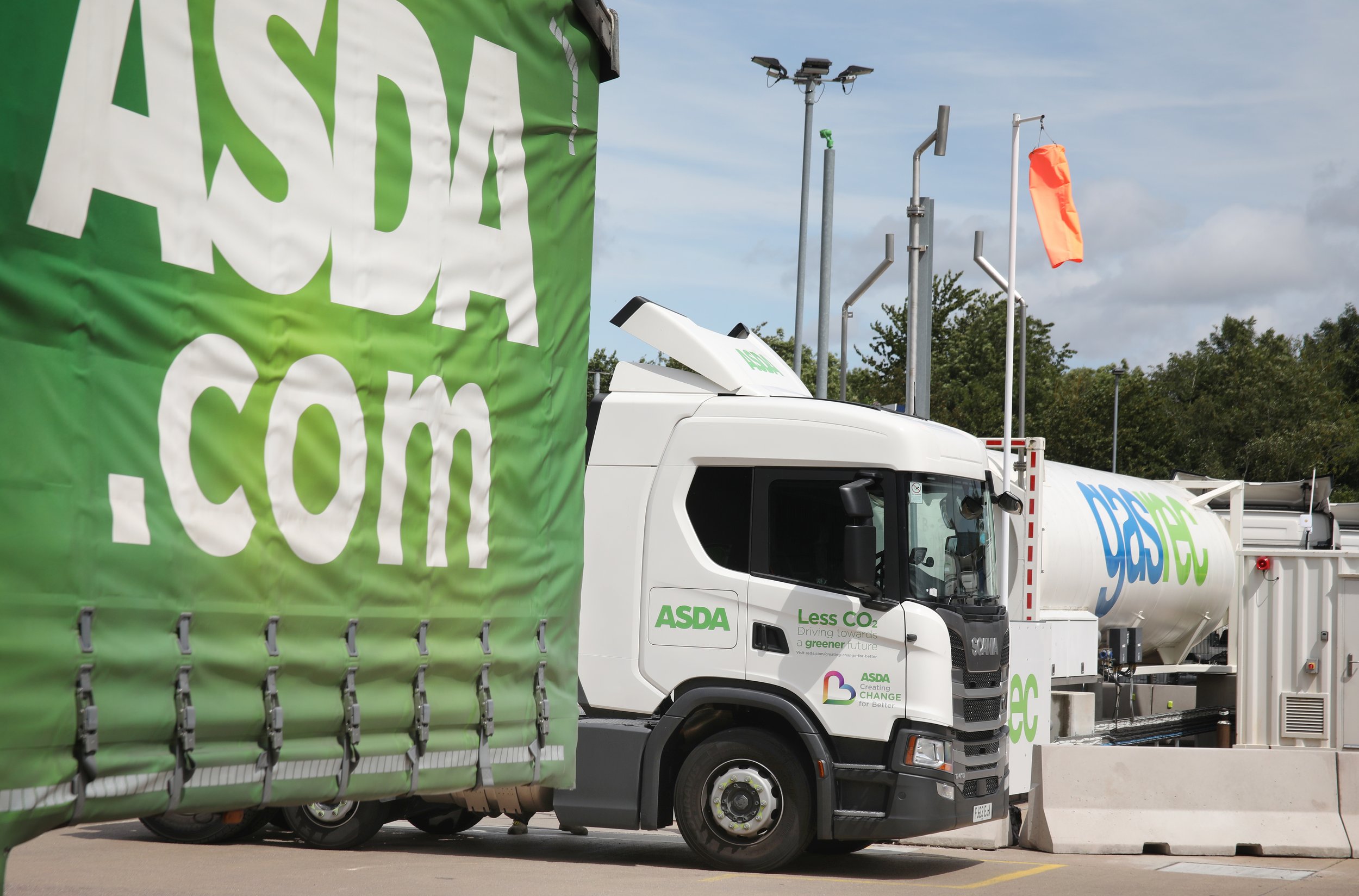
Insights
October 31, 2024
Asda Expands Bio-LNG Fueling for Fleet: A Step Toward Greener Logistics in the UK

Insights
October 31, 2024
Asda Expands Bio-LNG Fueling for Fleet: A Step Toward Greener Logistics in the UK
Asda is expanding its bio-LNG fueling infrastructure for its 780-vehicle fleet, reducing emissions and supporting sustainable logistics in the UK. Learn more about bio-LNG and its role in green fuel adoption.
As part of its commitment to sustainability, Asda has announced the addition of two new bio-LNG (liquefied natural gas) refueling stations for its fleet of 780 vehicles. This initiative demonstrates the company’s commitment to reducing greenhouse gas emissions in its logistics operations by providing a lower-emission alternative to diesel fuel. Asda’s move aligns with the logistics industry’s broader shift toward sustainable fuel solutions, helping to meet the growing demand for environmentally friendly heavy transportation options.
In this article, we’ll dive into the specifics of Asda’s bio-LNG expansion, the benefits of bio-LNG for logistics companies, the impact on the logistics industry, and the future opportunities and challenges in bio-LNG adoption.
Overview of Asda’s Bio-LNG Expansion
1.1 Details of Asda’s New Bio-LNG Refueling Stations
Asda’s new bio-LNG fueling stations are strategically located to support the company’s logistics operations and sustainability goals.
Locations and Specifications of New Stations:
These bio-LNG stations, located near key distribution centers, are designed to make refueling more accessible and efficient for Asda’s fleet. This setup enables vehicles to refuel at points along their routes, increasing convenience and reducing downtime.
Commitment to a Low-Emission Fleet:
Asda’s bio-LNG fueling initiative is a key part of the retailer’s broader sustainability goals, which include a commitment to reducing greenhouse gas emissions across logistics operations. By investing in these stations, Asda aims to lower emissions from its fleet and support cleaner, greener transport in the UK.
1.2 The Role of Bio-LNG in Sustainable Fleet Operations
Bio-LNG is gaining popularity as a cleaner alternative to diesel, aligning with the logistics sector’s sustainability goals.
Bio-LNG as a Green Alternative to Diesel:
Bio-LNG is produced from organic waste materials, making it a renewable energy source. It emits significantly lower levels of CO2 and particulate matter compared to traditional diesel, which reduces the environmental impact of heavy-duty trucks.
The Importance of Green Fuel in Logistics:
Asda’s shift toward bio-LNG mirrors the logistics industry’s push for greener solutions. With bio-LNG, logistics providers can reduce emissions without sacrificing the power needed for heavy transportation, making it ideal for high-mileage, long-haul operations.
Benefits of Bio-LNG in Heavy Transportation
2.1 Reduction in Greenhouse Gas Emissions
Bio-LNG provides a substantial reduction in greenhouse gas emissions, making it an attractive option for sustainability-focused companies.
Lower CO2 and Pollutant Emissions:
Compared to diesel, bio-LNG produces up to 90% less CO2 and emits fewer particulates and nitrogen oxides, which are major pollutants associated with traditional fuels. By transitioning to bio-LNG, Asda’s fleet contributes to cleaner air and lower overall emissions.
Bio-LNG’s Role in Meeting Emission Targets:
Governments and industries across Europe are setting ambitious emissions targets. Bio-LNG adoption can help companies like Asda meet these targets, which are increasingly critical in the context of regulatory and environmental pressures to curb emissions.
2.2 Enhanced Efficiency and Cost Benefits for Logistics Companies
In addition to its environmental benefits, bio-LNG offers cost advantages that can make a positive impact on fleet operations.
Improved Fuel Efficiency of Bio-LNG:
Bio-LNG offers better mileage than diesel, allowing trucks to cover longer distances without the need for frequent refueling stops. This efficiency is especially advantageous for Asda’s high-mileage routes, as it enables fleet optimization and potentially lowers fuel expenses.
Potential Cost Savings from Lower Fuel Taxes and Incentives:
Many European countries offer financial incentives, such as reduced fuel taxes, to companies using renewable fuels like bio-LNG. These incentives help make bio-LNG a more cost-effective choice, allowing companies to reduce operational expenses while contributing to sustainability.
Impact of Asda’s Bio-LNG Expansion on the Logistics Industry
3.1 Driving Industry-Wide Adoption of Green Fuels
Asda’s investment in bio-LNG has broader implications for the logistics industry, potentially inspiring other companies to follow suit.
Asda’s Leadership Role in Green Fuel Adoption:
Asda’s bio-LNG expansion positions it as a leader in green logistics within the UK. This move may encourage other major retailers and logistics providers to consider bio-LNG as a viable option, leading to industry-wide shifts toward greener fuels.
Collaborative Efforts with Fuel Providers:
Asda’s partnership with bio-LNG providers helps strengthen the market for bio-LNG, making the fuel more accessible to other companies. Collaborative efforts like these are essential to establishing a comprehensive green fuel network, which will benefit the entire logistics sector.
3.2 Strengthening the Case for Sustainable Logistics
By adopting bio-LNG, Asda is not only reducing its environmental impact but also enhancing the logistics industry’s public image.
Improving Public Perception of Logistics Companies:
Sustainability initiatives in logistics, such as bio-LNG adoption, enhance the public perception of the industry. Asda’s efforts signal that logistics companies are serious about reducing their carbon footprint, aligning with consumers’ growing expectations for sustainable business practices.
Supporting Government and Industry Goals for Emission Reduction:
Asda’s investment in bio-LNG supports the UK’s climate targets, particularly in reducing emissions from transportation. These efforts contribute to both governmental and industry-wide objectives for lowering emissions, making logistics a more sustainable sector.
Challenges and Future Opportunities in Bio-LNG Adoption
4.1 Challenges in Scaling Bio-LNG Infrastructure
While bio-LNG offers significant benefits, there are still challenges to expanding the infrastructure needed to support widespread adoption.
Cost and Technical Barriers to Expanding Bio-LNG Stations:
Setting up bio-LNG refueling stations requires high initial investment, which can be a barrier for companies with smaller fleets or limited budgets. Technical requirements, such as storage and refueling equipment, also add to the setup costs.
Availability and Consistency of Bio-LNG Supply:
Bio-LNG relies on organic waste sources, which means that supply can vary. Ensuring consistent availability is critical for companies looking to scale bio-LNG across larger fleets, and building a reliable supply chain will be essential for long-term viability.
4.2 Future Potential and Opportunities for Bio-LNG in Logistics
Despite the challenges, bio-LNG has strong potential for growth and can complement other green technologies in logistics.
Expanding Bio-LNG Use Across the Industry:
As bio-LNG infrastructure grows and more companies adopt green fuels, bio-LNG could become more widely accessible across the logistics industry. This expansion will likely be driven by increased demand and supportive policies for green fuel solutions.
Complementing Other Green Technologies in Fleet Management:
Bio-LNG can work alongside other sustainable technologies, such as electric and hydrogen-powered vehicles. For logistics companies, a mixed-fuel approach can help address various operational needs, ensuring both short- and long-haul routes are powered by the most efficient and eco-friendly fuel options available.
Conclusion
Asda’s bio-LNG fueling expansion is a significant step forward in promoting sustainable logistics in the UK. By investing in bio-LNG infrastructure, Asda is not only reducing its fleet’s emissions but also setting a standard for the logistics industry. While challenges remain in scaling bio-LNG infrastructure, the benefits of bio-LNG—including lower emissions, better fuel efficiency, and potential cost savings—make it an attractive solution for logistics companies focused on sustainability.
Key Takeaways:
Asda’s two new bio-LNG stations will support its fleet of 780 vehicles, helping the company meet its sustainability goals and reduce greenhouse gas emissions.
Bio-LNG offers environmental and operational advantages, positioning it as a viable green fuel alternative for logistics companies.
Asda’s leadership could inspire further adoption of bio-LNG, strengthening the green fuel infrastructure in the logistics industry.
Are you considering green fuel solutions for your fleet? Share your experiences and thoughts on bio-LNG adoption below!
As part of its commitment to sustainability, Asda has announced the addition of two new bio-LNG (liquefied natural gas) refueling stations for its fleet of 780 vehicles. This initiative demonstrates the company’s commitment to reducing greenhouse gas emissions in its logistics operations by providing a lower-emission alternative to diesel fuel. Asda’s move aligns with the logistics industry’s broader shift toward sustainable fuel solutions, helping to meet the growing demand for environmentally friendly heavy transportation options.
In this article, we’ll dive into the specifics of Asda’s bio-LNG expansion, the benefits of bio-LNG for logistics companies, the impact on the logistics industry, and the future opportunities and challenges in bio-LNG adoption.
Overview of Asda’s Bio-LNG Expansion
1.1 Details of Asda’s New Bio-LNG Refueling Stations
Asda’s new bio-LNG fueling stations are strategically located to support the company’s logistics operations and sustainability goals.
Locations and Specifications of New Stations:
These bio-LNG stations, located near key distribution centers, are designed to make refueling more accessible and efficient for Asda’s fleet. This setup enables vehicles to refuel at points along their routes, increasing convenience and reducing downtime.
Commitment to a Low-Emission Fleet:
Asda’s bio-LNG fueling initiative is a key part of the retailer’s broader sustainability goals, which include a commitment to reducing greenhouse gas emissions across logistics operations. By investing in these stations, Asda aims to lower emissions from its fleet and support cleaner, greener transport in the UK.
1.2 The Role of Bio-LNG in Sustainable Fleet Operations
Bio-LNG is gaining popularity as a cleaner alternative to diesel, aligning with the logistics sector’s sustainability goals.
Bio-LNG as a Green Alternative to Diesel:
Bio-LNG is produced from organic waste materials, making it a renewable energy source. It emits significantly lower levels of CO2 and particulate matter compared to traditional diesel, which reduces the environmental impact of heavy-duty trucks.
The Importance of Green Fuel in Logistics:
Asda’s shift toward bio-LNG mirrors the logistics industry’s push for greener solutions. With bio-LNG, logistics providers can reduce emissions without sacrificing the power needed for heavy transportation, making it ideal for high-mileage, long-haul operations.
Benefits of Bio-LNG in Heavy Transportation
2.1 Reduction in Greenhouse Gas Emissions
Bio-LNG provides a substantial reduction in greenhouse gas emissions, making it an attractive option for sustainability-focused companies.
Lower CO2 and Pollutant Emissions:
Compared to diesel, bio-LNG produces up to 90% less CO2 and emits fewer particulates and nitrogen oxides, which are major pollutants associated with traditional fuels. By transitioning to bio-LNG, Asda’s fleet contributes to cleaner air and lower overall emissions.
Bio-LNG’s Role in Meeting Emission Targets:
Governments and industries across Europe are setting ambitious emissions targets. Bio-LNG adoption can help companies like Asda meet these targets, which are increasingly critical in the context of regulatory and environmental pressures to curb emissions.
2.2 Enhanced Efficiency and Cost Benefits for Logistics Companies
In addition to its environmental benefits, bio-LNG offers cost advantages that can make a positive impact on fleet operations.
Improved Fuel Efficiency of Bio-LNG:
Bio-LNG offers better mileage than diesel, allowing trucks to cover longer distances without the need for frequent refueling stops. This efficiency is especially advantageous for Asda’s high-mileage routes, as it enables fleet optimization and potentially lowers fuel expenses.
Potential Cost Savings from Lower Fuel Taxes and Incentives:
Many European countries offer financial incentives, such as reduced fuel taxes, to companies using renewable fuels like bio-LNG. These incentives help make bio-LNG a more cost-effective choice, allowing companies to reduce operational expenses while contributing to sustainability.
Impact of Asda’s Bio-LNG Expansion on the Logistics Industry
3.1 Driving Industry-Wide Adoption of Green Fuels
Asda’s investment in bio-LNG has broader implications for the logistics industry, potentially inspiring other companies to follow suit.
Asda’s Leadership Role in Green Fuel Adoption:
Asda’s bio-LNG expansion positions it as a leader in green logistics within the UK. This move may encourage other major retailers and logistics providers to consider bio-LNG as a viable option, leading to industry-wide shifts toward greener fuels.
Collaborative Efforts with Fuel Providers:
Asda’s partnership with bio-LNG providers helps strengthen the market for bio-LNG, making the fuel more accessible to other companies. Collaborative efforts like these are essential to establishing a comprehensive green fuel network, which will benefit the entire logistics sector.
3.2 Strengthening the Case for Sustainable Logistics
By adopting bio-LNG, Asda is not only reducing its environmental impact but also enhancing the logistics industry’s public image.
Improving Public Perception of Logistics Companies:
Sustainability initiatives in logistics, such as bio-LNG adoption, enhance the public perception of the industry. Asda’s efforts signal that logistics companies are serious about reducing their carbon footprint, aligning with consumers’ growing expectations for sustainable business practices.
Supporting Government and Industry Goals for Emission Reduction:
Asda’s investment in bio-LNG supports the UK’s climate targets, particularly in reducing emissions from transportation. These efforts contribute to both governmental and industry-wide objectives for lowering emissions, making logistics a more sustainable sector.
Challenges and Future Opportunities in Bio-LNG Adoption
4.1 Challenges in Scaling Bio-LNG Infrastructure
While bio-LNG offers significant benefits, there are still challenges to expanding the infrastructure needed to support widespread adoption.
Cost and Technical Barriers to Expanding Bio-LNG Stations:
Setting up bio-LNG refueling stations requires high initial investment, which can be a barrier for companies with smaller fleets or limited budgets. Technical requirements, such as storage and refueling equipment, also add to the setup costs.
Availability and Consistency of Bio-LNG Supply:
Bio-LNG relies on organic waste sources, which means that supply can vary. Ensuring consistent availability is critical for companies looking to scale bio-LNG across larger fleets, and building a reliable supply chain will be essential for long-term viability.
4.2 Future Potential and Opportunities for Bio-LNG in Logistics
Despite the challenges, bio-LNG has strong potential for growth and can complement other green technologies in logistics.
Expanding Bio-LNG Use Across the Industry:
As bio-LNG infrastructure grows and more companies adopt green fuels, bio-LNG could become more widely accessible across the logistics industry. This expansion will likely be driven by increased demand and supportive policies for green fuel solutions.
Complementing Other Green Technologies in Fleet Management:
Bio-LNG can work alongside other sustainable technologies, such as electric and hydrogen-powered vehicles. For logistics companies, a mixed-fuel approach can help address various operational needs, ensuring both short- and long-haul routes are powered by the most efficient and eco-friendly fuel options available.
Conclusion
Asda’s bio-LNG fueling expansion is a significant step forward in promoting sustainable logistics in the UK. By investing in bio-LNG infrastructure, Asda is not only reducing its fleet’s emissions but also setting a standard for the logistics industry. While challenges remain in scaling bio-LNG infrastructure, the benefits of bio-LNG—including lower emissions, better fuel efficiency, and potential cost savings—make it an attractive solution for logistics companies focused on sustainability.
Key Takeaways:
Asda’s two new bio-LNG stations will support its fleet of 780 vehicles, helping the company meet its sustainability goals and reduce greenhouse gas emissions.
Bio-LNG offers environmental and operational advantages, positioning it as a viable green fuel alternative for logistics companies.
Asda’s leadership could inspire further adoption of bio-LNG, strengthening the green fuel infrastructure in the logistics industry.
Are you considering green fuel solutions for your fleet? Share your experiences and thoughts on bio-LNG adoption below!
Asda is expanding its bio-LNG fueling infrastructure for its 780-vehicle fleet, reducing emissions and supporting sustainable logistics in the UK. Learn more about bio-LNG and its role in green fuel adoption.
As part of its commitment to sustainability, Asda has announced the addition of two new bio-LNG (liquefied natural gas) refueling stations for its fleet of 780 vehicles. This initiative demonstrates the company’s commitment to reducing greenhouse gas emissions in its logistics operations by providing a lower-emission alternative to diesel fuel. Asda’s move aligns with the logistics industry’s broader shift toward sustainable fuel solutions, helping to meet the growing demand for environmentally friendly heavy transportation options.
In this article, we’ll dive into the specifics of Asda’s bio-LNG expansion, the benefits of bio-LNG for logistics companies, the impact on the logistics industry, and the future opportunities and challenges in bio-LNG adoption.
Overview of Asda’s Bio-LNG Expansion
1.1 Details of Asda’s New Bio-LNG Refueling Stations
Asda’s new bio-LNG fueling stations are strategically located to support the company’s logistics operations and sustainability goals.
Locations and Specifications of New Stations:
These bio-LNG stations, located near key distribution centers, are designed to make refueling more accessible and efficient for Asda’s fleet. This setup enables vehicles to refuel at points along their routes, increasing convenience and reducing downtime.
Commitment to a Low-Emission Fleet:
Asda’s bio-LNG fueling initiative is a key part of the retailer’s broader sustainability goals, which include a commitment to reducing greenhouse gas emissions across logistics operations. By investing in these stations, Asda aims to lower emissions from its fleet and support cleaner, greener transport in the UK.
1.2 The Role of Bio-LNG in Sustainable Fleet Operations
Bio-LNG is gaining popularity as a cleaner alternative to diesel, aligning with the logistics sector’s sustainability goals.
Bio-LNG as a Green Alternative to Diesel:
Bio-LNG is produced from organic waste materials, making it a renewable energy source. It emits significantly lower levels of CO2 and particulate matter compared to traditional diesel, which reduces the environmental impact of heavy-duty trucks.
The Importance of Green Fuel in Logistics:
Asda’s shift toward bio-LNG mirrors the logistics industry’s push for greener solutions. With bio-LNG, logistics providers can reduce emissions without sacrificing the power needed for heavy transportation, making it ideal for high-mileage, long-haul operations.
Benefits of Bio-LNG in Heavy Transportation
2.1 Reduction in Greenhouse Gas Emissions
Bio-LNG provides a substantial reduction in greenhouse gas emissions, making it an attractive option for sustainability-focused companies.
Lower CO2 and Pollutant Emissions:
Compared to diesel, bio-LNG produces up to 90% less CO2 and emits fewer particulates and nitrogen oxides, which are major pollutants associated with traditional fuels. By transitioning to bio-LNG, Asda’s fleet contributes to cleaner air and lower overall emissions.
Bio-LNG’s Role in Meeting Emission Targets:
Governments and industries across Europe are setting ambitious emissions targets. Bio-LNG adoption can help companies like Asda meet these targets, which are increasingly critical in the context of regulatory and environmental pressures to curb emissions.
2.2 Enhanced Efficiency and Cost Benefits for Logistics Companies
In addition to its environmental benefits, bio-LNG offers cost advantages that can make a positive impact on fleet operations.
Improved Fuel Efficiency of Bio-LNG:
Bio-LNG offers better mileage than diesel, allowing trucks to cover longer distances without the need for frequent refueling stops. This efficiency is especially advantageous for Asda’s high-mileage routes, as it enables fleet optimization and potentially lowers fuel expenses.
Potential Cost Savings from Lower Fuel Taxes and Incentives:
Many European countries offer financial incentives, such as reduced fuel taxes, to companies using renewable fuels like bio-LNG. These incentives help make bio-LNG a more cost-effective choice, allowing companies to reduce operational expenses while contributing to sustainability.
Impact of Asda’s Bio-LNG Expansion on the Logistics Industry
3.1 Driving Industry-Wide Adoption of Green Fuels
Asda’s investment in bio-LNG has broader implications for the logistics industry, potentially inspiring other companies to follow suit.
Asda’s Leadership Role in Green Fuel Adoption:
Asda’s bio-LNG expansion positions it as a leader in green logistics within the UK. This move may encourage other major retailers and logistics providers to consider bio-LNG as a viable option, leading to industry-wide shifts toward greener fuels.
Collaborative Efforts with Fuel Providers:
Asda’s partnership with bio-LNG providers helps strengthen the market for bio-LNG, making the fuel more accessible to other companies. Collaborative efforts like these are essential to establishing a comprehensive green fuel network, which will benefit the entire logistics sector.
3.2 Strengthening the Case for Sustainable Logistics
By adopting bio-LNG, Asda is not only reducing its environmental impact but also enhancing the logistics industry’s public image.
Improving Public Perception of Logistics Companies:
Sustainability initiatives in logistics, such as bio-LNG adoption, enhance the public perception of the industry. Asda’s efforts signal that logistics companies are serious about reducing their carbon footprint, aligning with consumers’ growing expectations for sustainable business practices.
Supporting Government and Industry Goals for Emission Reduction:
Asda’s investment in bio-LNG supports the UK’s climate targets, particularly in reducing emissions from transportation. These efforts contribute to both governmental and industry-wide objectives for lowering emissions, making logistics a more sustainable sector.
Challenges and Future Opportunities in Bio-LNG Adoption
4.1 Challenges in Scaling Bio-LNG Infrastructure
While bio-LNG offers significant benefits, there are still challenges to expanding the infrastructure needed to support widespread adoption.
Cost and Technical Barriers to Expanding Bio-LNG Stations:
Setting up bio-LNG refueling stations requires high initial investment, which can be a barrier for companies with smaller fleets or limited budgets. Technical requirements, such as storage and refueling equipment, also add to the setup costs.
Availability and Consistency of Bio-LNG Supply:
Bio-LNG relies on organic waste sources, which means that supply can vary. Ensuring consistent availability is critical for companies looking to scale bio-LNG across larger fleets, and building a reliable supply chain will be essential for long-term viability.
4.2 Future Potential and Opportunities for Bio-LNG in Logistics
Despite the challenges, bio-LNG has strong potential for growth and can complement other green technologies in logistics.
Expanding Bio-LNG Use Across the Industry:
As bio-LNG infrastructure grows and more companies adopt green fuels, bio-LNG could become more widely accessible across the logistics industry. This expansion will likely be driven by increased demand and supportive policies for green fuel solutions.
Complementing Other Green Technologies in Fleet Management:
Bio-LNG can work alongside other sustainable technologies, such as electric and hydrogen-powered vehicles. For logistics companies, a mixed-fuel approach can help address various operational needs, ensuring both short- and long-haul routes are powered by the most efficient and eco-friendly fuel options available.
Conclusion
Asda’s bio-LNG fueling expansion is a significant step forward in promoting sustainable logistics in the UK. By investing in bio-LNG infrastructure, Asda is not only reducing its fleet’s emissions but also setting a standard for the logistics industry. While challenges remain in scaling bio-LNG infrastructure, the benefits of bio-LNG—including lower emissions, better fuel efficiency, and potential cost savings—make it an attractive solution for logistics companies focused on sustainability.
Key Takeaways:
Asda’s two new bio-LNG stations will support its fleet of 780 vehicles, helping the company meet its sustainability goals and reduce greenhouse gas emissions.
Bio-LNG offers environmental and operational advantages, positioning it as a viable green fuel alternative for logistics companies.
Asda’s leadership could inspire further adoption of bio-LNG, strengthening the green fuel infrastructure in the logistics industry.
Are you considering green fuel solutions for your fleet? Share your experiences and thoughts on bio-LNG adoption below!
Other Blogs
Other Blogs
Check our other project Blogs with useful insight and information for your businesses
Other Blogs
Other Blogs
Check our other project Blogs with useful insight and information for your businesses
Other Blogs
Other Blogs
Check our other project Blogs with useful insight and information for your businesses


